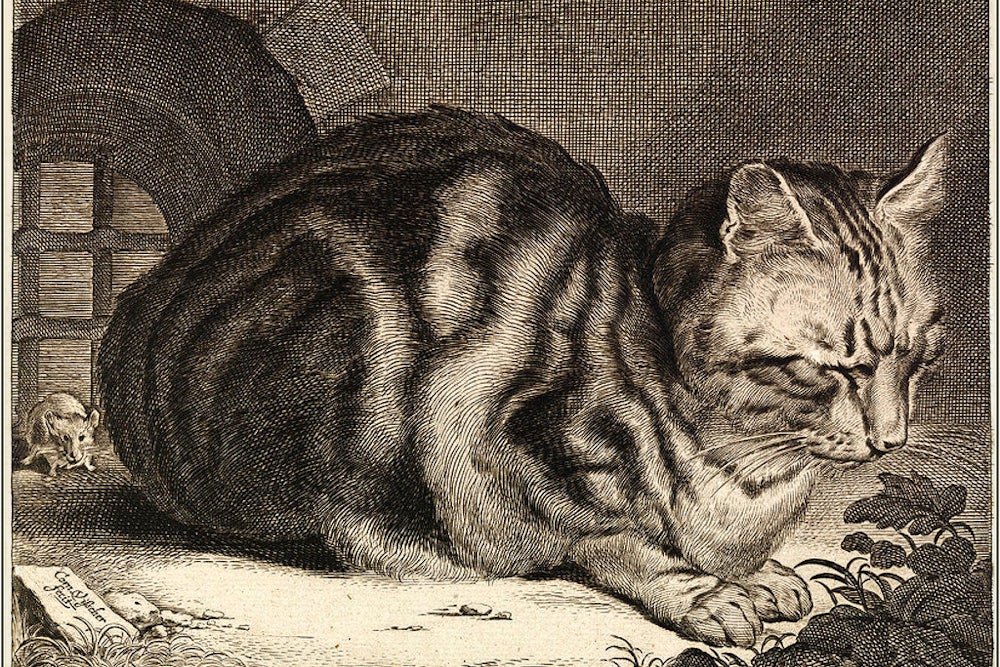The New York Times has a tense relationship with “pussy.” The newspaper named Pussy Riot from the start, but the band Perfect Pussy had to get very famous before the Times would list them as anything other than “unprintable name.” One was a newsworthy pussy, the other merely a pussy of culture.
Last year, hot mic recordings revealed that Donald Trump had crowed about grabbing women “by the pussy.” The Times had to edit their reporting to include the word, having, at first, omitted it. For Trump, “pussy” is a sexualized slang word that refers to female primary sex organs, which he claimed to have grabbed with a part of his anatomy (one, perhaps two, of his tiny hands). This slang noun possibly derives from the Norse word for “pouch,” or by analogy with the small, warm, furry animal.
Of course, “pussy” has metaphorical meanings too. A cowardly man is called a “pussy.” This use of pussy is obviously misogynistic, as it figuratively connects the vulva with weakness. As Fast Times at Ridgemont High’s Mike Damone puts it in a false but compelling etymology, “You are a wuss: Part wimp, and part pussy.”
“Pussy” can also be used insultingly to refer to multiple women, in the sense of, say, a room that is filled with pussy. This usage transforms pussy to a substance, like flour, or sheep. More happily, “pussy” has also always had a cheerful life in the mouths of women, whether in erotic speech or simply as an affectionate term for a beloved organ. But none of these are the sense of “pussy” that has lately captured the mainstream feminist imagination.
As millions across the world marched against Trump’s misogyny this weekend, “pussy” was used as a synecdoche for “woman.” Thousands of signs proclaimed that “this pussy grabs back,” and “keep your tiny hands off my [cat drawing],” and the like. Each sea of heads bobbed pink with “pussy hats,” the weather-appropriate design distributed by an activist knitting group. The author Nicholson Baker photographed himself in one such hat, made for him by his friend, Sally.
Each time “pussy” was reclaimed from Trump in this way, a pussy got the agency, when really a whole human being was marching. Synecdoche is a type of metonymy. Metonymy is when you use a word for something taken from that word’s associations or qualities. For example, we use “red tape” to mean bureaucracy. Synecdoche is a specific type of metonymy, in which we use the word for a part of a thing, to refer to the whole thing (or vice versa). If I asked my partner’s father for their “hand” in marriage, say, I wouldn’t just be after the hand.
The problem with synecdoche is that it can make the larger and more complicated concept seem like it is no more than the part. Synecdoche by its nature, reduces. Ideally, however, synecdoche should reduce a concept the way that a sauce reduces as it thickens. It should somehow distill the concept into a more flavorful tincture. It should express some kind of super-meaning at the heart of things.
But “pussy” is not the meaning at the heart of “woman,” nor of feminism. Biological imperatives are a part of any feminist agenda, yes: Women’s health medicine, birth control, child care, and hormone treatments all keep women safe and alive. But the body that has been assigned female at birth is not the center of feminist advocacy, and many activists feel that the biology-centric rhetoric of this week’s march was a little crude.
At least in the United States, feminists broadly accept that cisgender women are not the sole proprietors of womanhood, nor does a woman need to possess any particular body part in order to qualify as female, nor does a person need to identify as a woman in order to receive the health care usually labeled “women’s.” (Trans-exclusionary radical feminism is more popular in the United Kingdom, where an older generation of second-wave feminists have been part of the media mainstream for decades.)
If genitals do not a woman make, why do today’s protesters feel this need to latch on to “pussy” and not let go? An uncomfortable part of the truth is that bourgeois women thought that the hats were cute, and so the hats conferred a kind of talismanic sense of community on their wearers. Also, “pussy” has a diminutive feel to it, a cutesy and palatable euphemism for the reproductive organs, whose freedoms Trump and Co. wish radically to curtail.
Women’s health care is under terrible attack. While Planned Parenthood struggles to keep up with demand for IUDs, Mike Pence, the maniacally anti-abortion fundamentalist, takes the vice presidency. On Monday, Trump reinstated the so-called “global gag rule” that bans organizations receiving U.S. aid from speaking about abortion. Women will die, then more women will die.
These conditions demand that we re-center the body, but that we also conceive of a feminism with many centers. Justice is a singular noun but, in practice, true equality is more like a dimensionless mesh of justices: The right of the pussy to its health is not more important than the right of the transwoman to her life, nor is it more important than the right of the woman of color to a mainstream feminism that is not coded white by default.
Every major news organization should be spelling out “pussy” by now. Although this word boils gender down in a way that should make us uncomfortable, its very ubiquity is cause for celebration. Once a word becomes part of a culture’s common lexicon, we honor that word and its speakers by interrogating it. Newsworthiness is the beginning, not the end, of a word’s public career. The future of feminism is more than the sum of its parts.
